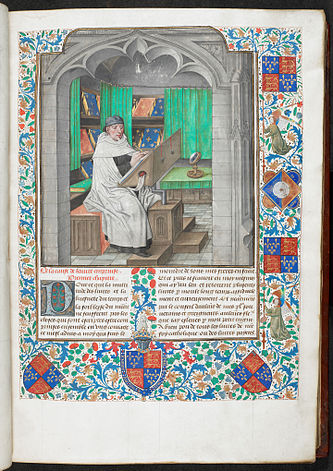 |
| Vincent of Beauvais writing his universal history. BL MS Royal 14 E.i |
These chronicles are a particular and rather weird genre. There is no overarching narrative (although they were often written to legitimate particular dynasties). Chronicles contain dozens, even hundreds, of characters, and they appear and then disappear with no fanfare. There are long stretches of description and exposition punctuated by shocking or terrible events (poisoning, beheading, treason, famine, war). Occasionally, the writer pauses for a digression...a love story, a convoluted plot, an accusation of sorcery. Chronicles end abruptly and often without any kind of denouement. And because universal histories cover synchronous events in different locales, the authors constantly need to signal that the next episode in the chronicle is happening contemporaneously with something else.
A Song of Ice and Fire is a universal history. Martin has created a world with an elaborate backstory and its own mythology. The books encompass the history of Westeros and include the dynastic tales of the Targaryens and the Andals. The shifting POV chapters ensure that the chronicle covers synchronous events. There are hundreds of characters, long stretches of description and exposition, digressions on sorcery or love or treason. Characters that we have gotten to know over hundreds of pages die suddenly...and the story keeps moving. This mirrors universal histories; someone is always getting shot with a stray arrow or choking on a plate of eels at the inopportune moment. Rains of blood, fiery portents, and magical occurrences appear in chronicles; Game of Thrones opens with wights and ends with the marvelous rebirth of dragons, and the dead stag and direwolf of the opening portend the fates of Robert Baratheon and Ned Stark.
The chronicle-nature of Game of Thrones accounts for its strengths and its weaknesses. It's what makes the show so rich and multi-layered, but it also means that there many characters and plots. It's hard to keep track of everyone, and it's also difficult to link the pieces into a larger narrative. So far, Benioff and Weiss are doing a good job, although I wonder how the show will change as the story gets even more complicated. It's also why there are so many digressions in the books (Meereen, anyone?). I'll be interested to see if GRRM will bring any closure or denouement to ASoIaF over the next two books, or if he'll just write "explicitus est liber" and be done with it.
No comments:
Post a Comment